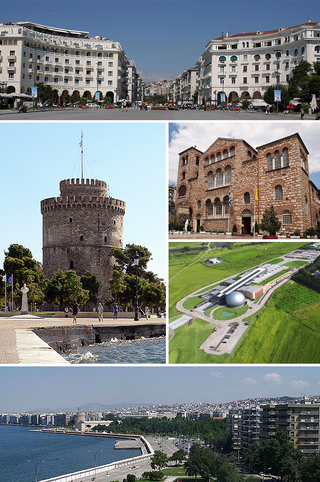Biography
Having been moved to act against the mighty Lyaeus, the most feared gladiator in Rome, who mocked and tormented the Christians in the arena, Nestor went to see the imprisoned St. Demetrius and asked for his blessing to fight and defeat Lyeios. With the blessing of the saint and faith in God, he entered the arena and mortally struck Lyeios.
Maximian, the emperor, was angered by this and ordered that Nestor be slain with his own sword.

Thessaloniki, also known as Thessalonica, Saloniki, Salonika, or Salonica, is the second-largest city in Greece, with slightly over one million inhabitants in its metropolitan area, and the capital of the geographic region of Macedonia, the administrative region of Central Macedonia and the Decentralized Administration of Macedonia and Thrace. It is also known in Greek as η Συμπρωτεύουσα, literally "the co-capital", a reference to its historical status as the Συμβασιλεύουσα or "co-reigning" city of the Byzantine Empire alongside Constantinople.

Saint Demetriusof Thessalonica, also known as the Holy Great-Martyr Demetrius the Myroblyte, was a Greek Christian martyr of the early 4th century AD.

April 13 - Eastern Orthodox liturgical calendar - April 15

June 25 - Eastern Orthodox Church calendar - June 27

The Church of Saint Demetrius, or Hagios Demetrios, is the main sanctuary dedicated to Saint Demetrius, the patron saint of Thessaloniki, dating from a time when it was the second largest city of the Byzantine Empire. Since 1988, it has been on the UNESCO World Heritage List as a part of the site Paleochristian and Byzantine monuments of Thessaloniki.

The history of the city of Thessaloniki dates back to the ancient Macedonians. Today with the opening of borders in Southeastern Europe it is currently experiencing a strong revival, serving as the prime port for the northern Greek regions of Macedonia and Thrace, as well as for the whole of Southeastern Europe.

The Church of Saint Demetrius of Thessaloniki is a medieval Bulgarian Orthodox church in the city of Veliko Tarnovo in central northern Bulgaria, the former capital of the Second Bulgarian Empire.
Jason of Thessalonica was a Jewish convert and early Christian believer mentioned in the New Testament in Acts 17:5–9 and Romans 16:21.

October 25 - Eastern Orthodox liturgical calendar - October 27

October 26 - Eastern Orthodox liturgical calendar - October 28

November 8 - Eastern Orthodox liturgical calendar - November 10

November 13 - Eastern Orthodox liturgical calendar - November 15

December 29 - Eastern Orthodox liturgical calendar - December 31

The Church of St. Demetrius is a Serbian Orthodox church in Dalj in eastern Croatia, and the cathedral of the Eparchy of Osječko polje and Baranja. The first church on this site was built in 1715, and the present-day church in 1799. The church of St. Demetrius is the largest cathedral of the Serbian Orthodox Church in Croatia.

The Miracles of Saint Demetrius is a 7th-century collection of homilies, written in Greek, accounting the miracles performed by the patron saint of Thessalonica, Saint Demetrius. It is a unique work for the history of the city and the Balkans in general, especially in relation to the Slavic invasions of the late 6th and 7th centuries, which are otherwise neglected by contemporary sources.
St. Lupus from Novae is a Dacian or Roman saint who was for a while the servant of St. Demetrius from Thessaloniki. He is celebrated on August 23. Lupus lived in Novae, a Roman fortress in the Danube valley, today the Bulgarian town Svishtov. He was contemporary with Roman Christian martyrs Montanus and Anastasia from Sirmium

Ioannis Tassias was a Greek Orthodox bishop, Metropolitan of Langadas as Ioannis of Langada from 2010 until his death in 2020.
Saint Aquilina of Thessalonica was an 18th-century Greek Orthodox Christian saint and martyr. She was born in Zagliberi, a village near Thessalonica in Greece at a time when Greece was under the rule of the Ottoman Empire. When she was a baby her father accidentally killed a Muslim neighbour, and converted to Islam in order to escape execution.
This page is based on this
Wikipedia article Text is available under the
CC BY-SA 4.0 license; additional terms may apply.
Images, videos and audio are available under their respective licenses.








